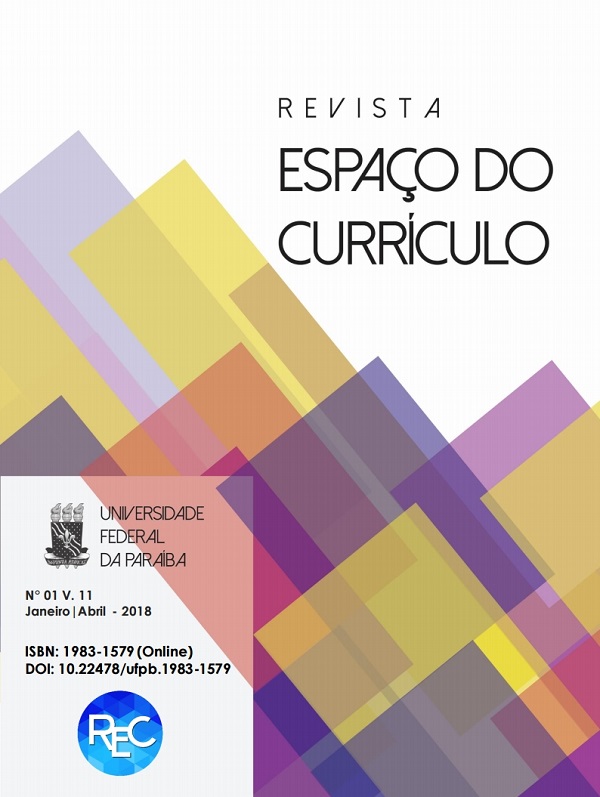THE CURRICULUM OF THE 7TH YEAR OF FUNDAMENTAL EDUCATION IN THE DISCIPLINE OF SCIENCES OF NATURE
DOI:
https://doi.org/10.22478/ufpb.1983-1579.2018v1n11.31228Keywords:
Curriculum, Sciences, Elementary schoolAbstract
This article aims to demonstrate the importance of the curriculum as an instrument for organizing school content. And yet, to present the difficulties found by science teachers to teach the content of the 7th year of elementary school. This content is provided for by the Common Basic Curriculum (CBC), a document that provides the fundamental aspects of each discipline, which cannot fail to be taught. However, it has extensive content for this year of elementary school, making it difficult for teachers to work and for students to learn, since when priority is given to compliance with the content prepared by the Ministry of Education and Culture (MEC), it is automatically disregarded. opportunity for the student to learn, due to the short time of science classes. In this context, the syllabus of the 7th grade needs to be better elaborated so that it is taught in its entirety and that the student's learning is really efficient. Therefore, it is important that science teachers have an active voice in the elaboration of the National Textbook Program (PNLD) and the CBC, since the reality is different from what is known to people working in governmental bodies. Finally, it should be considered that basic education is added to the reality of the citizen, helping him to reflect on the world around him and seek improvements.
Downloads
Metrics
References
ACADEMIA BRASILEIRA DE CIÊNCIAS. O ensino de ciências e a educação básica: propostas para superar a crise. Disponível em: http://www.schwartzman.org.br/simon/abcedcient.pdf. Acesso em: 09 set.2015.
BALL, S.J. Diretrizes Políticas Globais e Relações Políticas Locais em Educação. Ciências sem Fronteiras, v.1, n.2, p.99-116, 2001. Disponível em: http://www.curriculosemfronteiras.org/vol1iss2articles/ball.pdf. Acesso em: 06 out. 2015.
BERNSTEIN, A. A relação íntima entre currículo e cultura. Disponível em: http://educacaopublica.cederj.edu.br/revista/artigos/a-relacao-intima-entre-curriculo-e-cultura. Acesso em: 08 jan.2018.
BRASIL, 2008. Parâmetros Curriculares Nacionais. Disponível em: http://portal.mec.gov.br/seb/arquivos/pdf/meioambiente.pdf. Acesso em: 09 set.2015.
BRASIL, 2015. Lei Brasileira de Inclusão da Pessoa com Deficiência (Estatuto da Pessoa com Deficiência). Disponível em: http://www.planalto.gov.br/ccivil_03/_Ato2015-2018/2015/Lei/L13146.htm. Acesso em: 07 out. 2015.
CUNHA, A.M.O.; CICILLINI, G.A. Considerações sobre o ensino de ciências para a escola fundamental. In: VEIGA, I.P.A.; CARDOSO, M.H. Escola Fundamental Currículo e Ensino. Campinas: Papirus,1991, p.201-216.
FREIRE, P. A concepção bancária da educação como instrumento da opressão. Seus pressupostos, sua crítica. In: Pedagogia do oprimido. Rio de Janeiro: Paz e Terra,17ºed, p.33, 1987. Disponível em: http://files.portalconscienciapolitica.com.br/200000081-ed3e5ee3d0/Pedagogia%20do%20Oprimido.pdf. Acesso em: 08 jan.2018.
LIMA, E.S. Indagações sobre currículo: Currículo e Desenvolvimento Humano. Brasília: Ministério da Educação, Secretaria de Educação Básica, 2007. 56p. Disponível em: http://portal.mec.gov.br/seb/arquivos/pdf/Ensfund/indag1.pdf. Acesso em: 24 nov.2015.
LOPES, A.C. Políticas curriculares: continuidade ou mudança de rumos? Revista Brasileira de Educação, Nº26, p. 109-118, 2004. Disponível em: http://www.scielo.br/pdf/rbedu/n26/n26a08. Acesso em: 06 out. 2015.
LOPES, E.C.P.; CAPRIO, M. As influências do modelo neoliberal na educação. 2008. 16 f. Trabalho de Conclusão de Curso em Pedagogia- UNESP Araraquara, 2008. Disponível em: http://www.fclar.unesp.br/Home/Departamentos/CienciasdaEducacao/RevistaEletronica/edi5_artigoedianelopes.pdf. Acesso em: 11 nov.2015.
MALTA, A.C.F. et al. Sobrevoo: da ontogênese, pela infância e se detendo na velhice. Revista de Psicofisiologia, v.2, nº1,1998. Disponível em: http://labs.icb.ufmg.br/lpf/revista/revista2/sobrevoo/cap2_2.htm. Acesso em: 22 dez.2015.
MINISTÉRIO DA EDUCAÇÃO, 1998. Parâmetros Curriculares Nacionais: Ciências Naturais. Disponível em: http://portal.mec.gov.br/seb/arquivos/pdf/ciencias.pdf. Acesso em: 22 dez.2015.
MOREIRA, A. F. B. Currículo, cultura e formação de professores. Educar. Curitiba: Ed. da UFPR, nº17, p.39-52, 2001.
MOREIRA, A. F.B; CANDAU, V. M. Currículo, conhecimento e cultura. In: BRASIL, MINISTÉRIO DA EDUCAÇÃO, SECRETARIA DE EDUCAÇÃO BÁSICA. Indagações sobre currículo. Brasília: Ministério da Educação, 2007.
MOREIRA, A.F.B. Currículo: questões atuais. In: MOREIRA, A.F.B. Currículo, utopia e pós modernidade. Campinas: Papirus, 2008, p.9- 28.
SECRETARIA DE ESTADO DE EDUCAÇÃO DE MINAS GERAIS. Disponível em: http://pt.slideshare.net/toniafeto/cbc-anos-finais-cincias. Acesso em: 09 set. 2015.
SECRETARIA MUNICIPAL DE EDUCAÇÃO DE UBERLÂNDIA (MG). Diretrizes curriculares municipais. Disponível: https://dl.dropboxusercontent.com/u/41666152/NETgravar/Diretrizes%20Curriculares%20Municipais%20071211.pdf. Acesso em: 22 dez.2015.
SCHEIBE, L.; BOMBASSARO, T. Sala ambiente Currículo, cultura e conhecimento escolar. Disponível em: http://coordenacaoescolagestores.mec.gov.br/uft/file.php/1/coord_ped/sala_5/pdf/sala_5_curriculo_cultura_e_conhecimento_escolar.pdf. Acesso em: 11 nov.2015.
SINDICATO DE ESPECIALISTAS DE EDUCAÇÃO DO MAGISTÉRIO OFICIAL DO ESTADO DE SÃO PAULO. Por um novo currículo de ciências. Disponível em: http://www.udemo.org.br/RevistaPP_02_12PorUmNovo.htm. Acesso em: 22 dez.2015.
TAVARES, R. Aprendizagem significativa e o ensino de ciências. Ciências & Cognição, v.13, nº1, p.94-100, 2008. Disponível em: http://www.fisica.ufpb.br/~romero/pdf/ANPED-28.pdf. Acesso em: 22 dez.2015.
TERRA, M.R. O desenvolvimento humano na teoria de Piaget. Disponível em: http://www.unicamp.br/iel/site/alunos/publicacoes/textos/d00005.htm. Acesso em: 22 dez. 2015.
VASCONCELOS, S. D.; SOUTO, E. O livro didático de Ciências no Ensino Fundamental – proposta de critérios para análise do conteúdo zoológico. Ciência & Educação, v. 9, n. 1, p.93-104, 2003. Disponível em: http://www.scielo.br/pdf/ciedu/v9n1/08. Acesso em: 07 out.2015.
VEIGA, I.P.A. Escola, currículo e ensino. In: VEIGA, I.P.A. Escola Fundamental Currículo e Ensino. Campinas: Papirus,1991, p.77-95.
ZATTI, V. Autonomia e educação em Immanuel Kant e Paulo Freire. Porto Alegre: EdiPUCRS, 2007, não paginado. Disponível em: http://www.pucrs.br/edipucrs/online/autonomia/autonomia/3.6.html. Acessado em: 11 nov. 2015.
Downloads
Published
How to Cite
Issue
Section
License
By submitting an article to Curriculum Space Journal (CSJ) and having it approved, the authors agree to assign, without remuneration, the following rights to Curriculum Space Journal: first publication rights and permission for CSJ to redistribute this article. article and its metadata to the indexing and reference services that its editors deem appropriate.
















